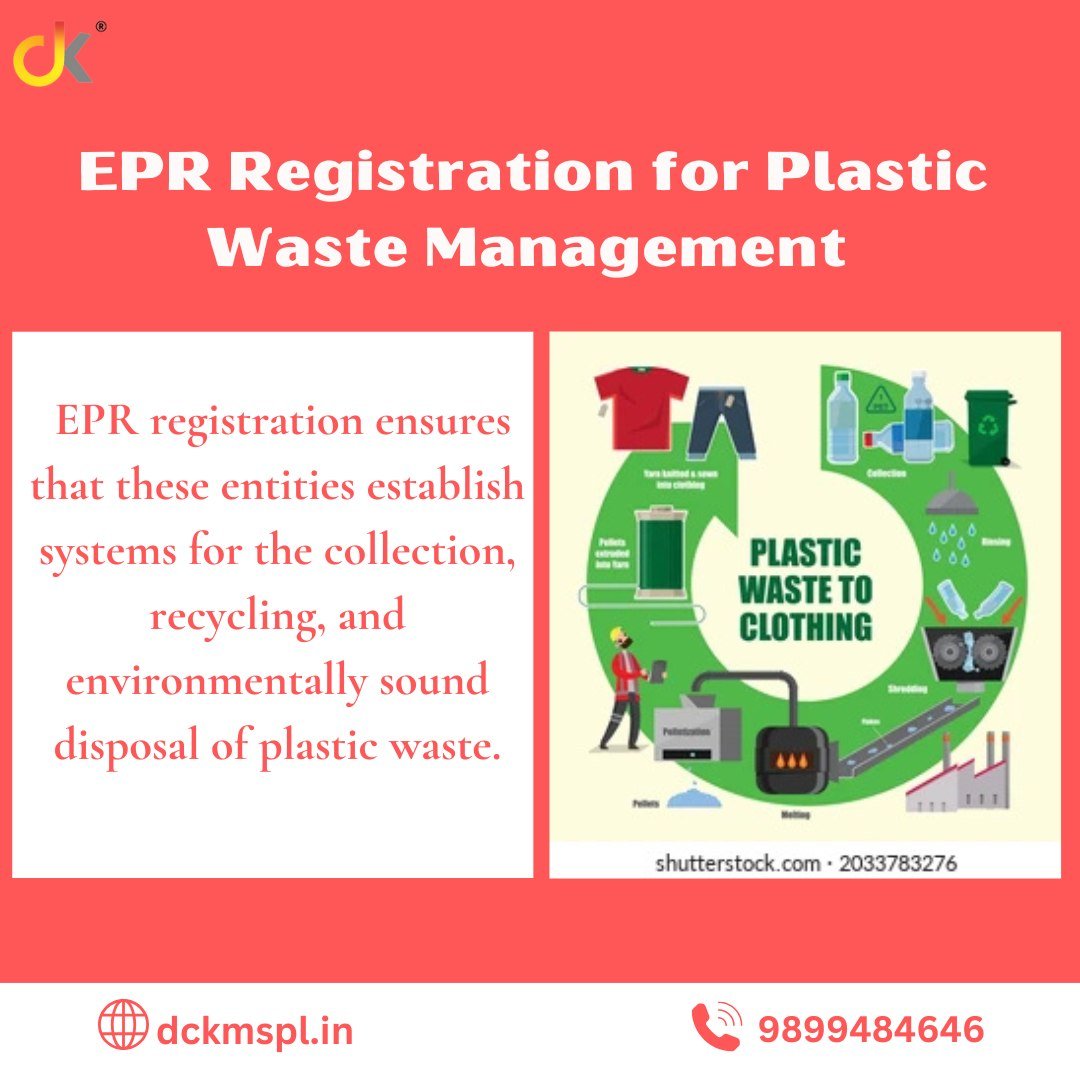Plastic waste management has become a critical issue worldwide, requiring urgent and innovative solutions to tackle its environmental consequences. Extended Producer Responsibility (EPR) is a regulatory strategy that has emerged as a cornerstone in managing plastic waste effectively. By holding producers accountable for the entire lifecycle of their products, EPR aims to reduce waste and promote sustainable practices. This article explores the intricacies of EPR registration for plastic waste management, its importance, challenges, and strategies to maximize its impact.
Understanding EPR and Its Relevance to Plastic Waste
EPR registration for plastic waste management is more than a regulatory requirement; it is a step toward a sustainable future. or Extended Producer Responsibility, is a framework where producers are made responsible for the collection, recycling, and safe disposal of their products after consumer use. In the context of plastic waste, EPR obligates manufacturers, brand owners, importers, and other stakeholders to establish mechanisms for managing the plastic waste generated by their products.Plastic waste is notoriously persistent in the environment, contributing to pollution, harming marine life, and releasing microplastics into ecosystems. EPR is not merely a compliance requirement but a proactive measure to address these challenges by encouraging stakeholders to adopt eco-friendly practices.
The Process of EPR Registration
The EPR registration process in India, governed by the Plastic Waste Management (PWM) Rules, requires businesses to undertake the following steps:
- Identify Obligations
Producers and stakeholders must first determine their responsibilities under the EPR framework. This includes assessing the type and volume of plastic they use and generate. - Develop an Action Plan
Companies must draft an action plan detailing how they intend to manage their plastic waste. This plan often involves partnerships with recycling companies and producer responsibility organizations (PROs). - Apply for Registration
Applications must be submitted online to the relevant pollution control board or central authority. The application should include business details, action plans, and proof of operational capacity for waste management. - Compliance and Audits
Registered entities must implement their action plans, maintain proper documentation, and undergo periodic audits to ensure compliance. - Renewals and Updates
EPR registrations are subject to periodic renewal, requiring updated plans and compliance reports.
Innovative Approaches to EPR for Plastic Waste
To make EPR effective and impactful, innovative approaches are being adopted worldwide:
- Circular Economy Models
Encouraging a shift from a linear “produce-use-dispose” model to a circular economy where plastic materials are continuously reused and recycled. - Technological Integration
Leveraging technologies like blockchain for traceability in plastic waste management ensures transparency and accountability in recycling processes. - Design for Sustainability
Promoting eco-friendly product designs that minimize the use of plastic and make materials easier to recycle. - Incentive Mechanisms
Offering financial incentives to companies and consumers for reducing plastic usage and participating in recycling programs.
Challenges in EPR Implementation
Despite its potential, implementing EPR for plastic waste management comes with several challenges:
- Lack of Awareness
Many businesses, particularly small and medium enterprises (SMEs), are unaware of EPR regulations and their responsibilities. - Inefficient Infrastructure
The recycling infrastructure in many regions is underdeveloped, making it difficult to meet EPR obligations. - High Costs
Setting up systems for waste collection and recycling can be cost-intensive, especially for smaller companies. - Enforcement Gaps
Weak regulatory enforcement and a lack of monitoring mechanisms undermine the effectiveness of EPR. - Consumer Participation
Effective plastic waste management requires consumer cooperation, which can be limited due to low awareness or motivation.
Benefits of EPR Registration
Implementing EPR offers several advantages that extend beyond regulatory compliance:
- Environmental Impact
Proper management of plastic waste reduces pollution, protects ecosystems, and mitigates the impact of climate change. - Corporate Social Responsibility (CSR)
EPR enhances a company’s CSR profile, demonstrating its commitment to environmental sustainability. - Economic Opportunities
Recycling and waste management create new business opportunities, jobs, and markets for recycled materials. - Brand Reputation
Companies adopting sustainable practices under EPR are perceived more favorably by consumers, boosting their brand image. - Regulatory Compliance
EPR compliance ensures businesses avoid penalties, fines, and legal complications.
Strategies for Effective EPR Implementation
To overcome challenges and maximize the benefits of EPR, stakeholders can adopt the following strategies:
- Collaborative Partnerships
Collaborate with PROs, recycling companies, and NGOs to streamline waste management processes. - Awareness Campaigns
Conduct educational campaigns targeting businesses and consumers to build awareness about EPR and its importance. - Investing in Technology
Adopt advanced recycling technologies and data management systems to improve efficiency and traceability. - Government Support
Advocate for policies that provide incentives for businesses to adopt EPR and invest in recycling infrastructure. - Consumer Engagement
Introduce consumer-friendly programs such as buy-back schemes and deposit systems to encourage recycling.
Future of EPR in Plastic Waste Management
The future of EPR in plastic waste management lies in its ability to evolve with changing environmental and economic needs. Governments are increasingly recognizing the importance of strong EPR frameworks, introducing stricter regulations and incentives for compliance.Emerging trends like green packaging, bio-based plastics, and artificial intelligence in recycling are set to redefine EPR practices. By fostering a culture of sustainability, EPR has the potential to drive a systemic change in how we produce, use, and manage plastic materials.
Conclusion
EPR registration for plastic waste management is more than a regulatory requirement; it is a step toward a sustainable future. By integrating innovative approaches, addressing challenges, and fostering collaboration, businesses can make a meaningful impact on the environment while gaining competitive advantages.The success of EPR lies in collective action — involving producers, consumers, governments, and recyclers. Together, we can turn the tide on plastic waste, ensuring a cleaner, greener planet for generations to come.
